We’ve just finished our first week with students – and it was amazing! As a team, our goal was to start the year respecting and supporting student agency as much as possible.
Here is what we tried:
1. Invest time in the “why”
So often as educators we spend lots of time thinking about and preparing “what” we are going to do with students during the first week of school. This year as a team, we took a step back and invested most of our energy thinking about our “why”. We had many discussions, disagreements and debates, which was needed in order to ensure we were all on the same page about planning a week that encouraged as much student voice, choice and ownership as possible.
2. Plan in response, not advance
Once we were all solid in our “why” we were able to begin to move onto the “how”. We agreed that in order to respect and support student agency, we needed to take an approach of planning in response to learning, instead of in advance. So we decided not to plan beyond the first day, to allow for us to meet our learners, make observations, and collect their feedback. We also agreed that in order to make this approach work we would need to meet as a team at the end of each day to debrief, share notes and collectively analyze any student feedback in order to plan for next steps.
3. Involve students in planning the first day
Even as we were planning the first day, we knew that we wanted to set the tone for flat power structures and shared decision making. So we decided to involve students in the co-construction of their first day of school. Which meant, as usual, we spent our time planning for their planning. How could we structure and support systems to allow for their ideas and perspectives?
First we invited students to brainstorm any and all ideas about how we could get to know each other and how we could get to know our school.
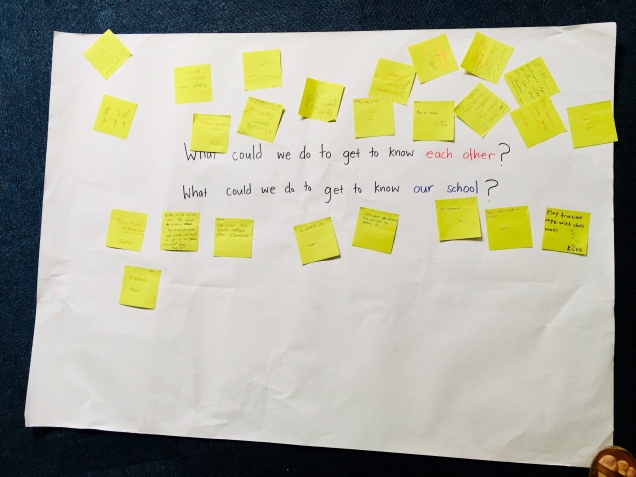
Then, we had them sort which activities were structured, whole group activities that we would need to do together and which were more unstructured, small group or individual activities.

Next, we had them vote on which activities they were most interested in and used that data to create an agenda for the day that balanced structured and unstructured times in the day.
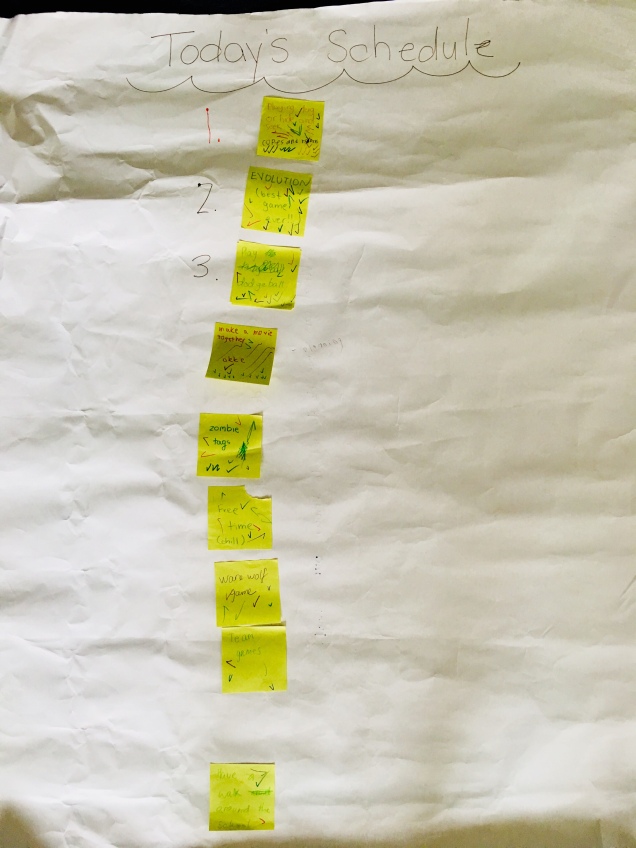
We also involved the students in collectively deciding how much time should be dedicated to each activity and what locations would be best for each activity. Students were also included in solving problems regarding the day’s agenda as they arose – like when another class was on the playground when we planned to go there, or when one activity ran longer than expected and there was not enough time for the next planned activity.
4. Teacher transparency
A huge theme that ran throughout the week (and we plan to continue throughout the year) is transparency – #nosecretteacherbusiness! Right from the get go we shared our “why” with them, involved them in decisions like how they want us to collect their attention in large groups and were honest with our reflections when things weren’t going according to plan.
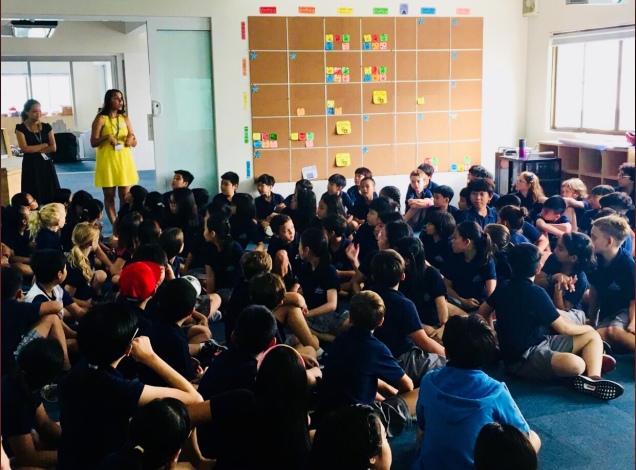
5. Involve students in setting up the learning space
A big way we wanted to walk the walk of agency, was involving them in setting up their learning spaces. So we decided the spend our time the week before school “unsetting” up the learning spaces to make time and space for their ideas about the learning environments that best support them as learners.



Since we also wanted to break the traditional mindset of “homerooms” we didn’t have the students set up just their classroom, we had all 120 students work together to set up the entire Grade 5 hallway – in total 10 learning spaces! (More about this in a blog post coming soon!)
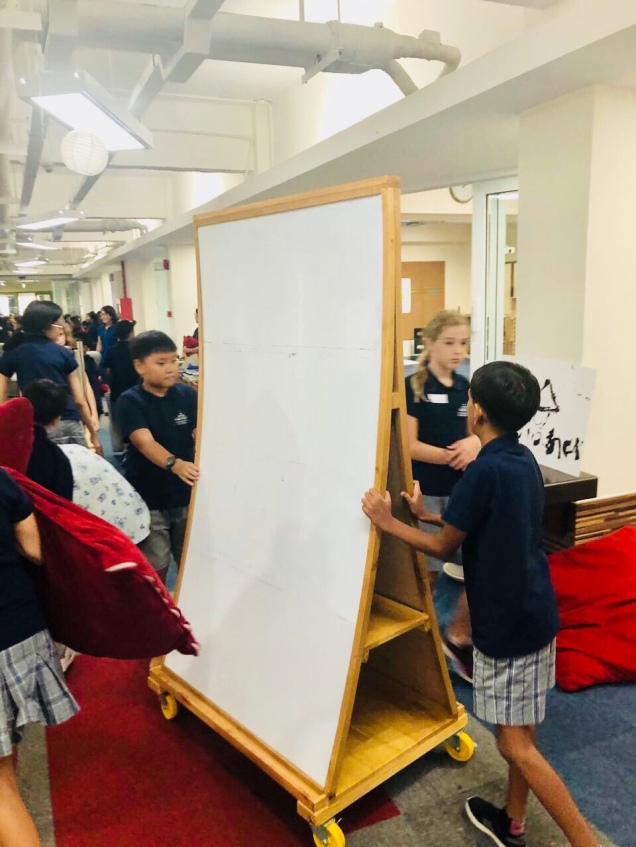
6. Provide opportunities for student voice
It was also very important that from day 1, students knew their voices matter. So we aimed to have many opportunities for students to share their thoughts, ideas, concerns, worries and suggestions with us.


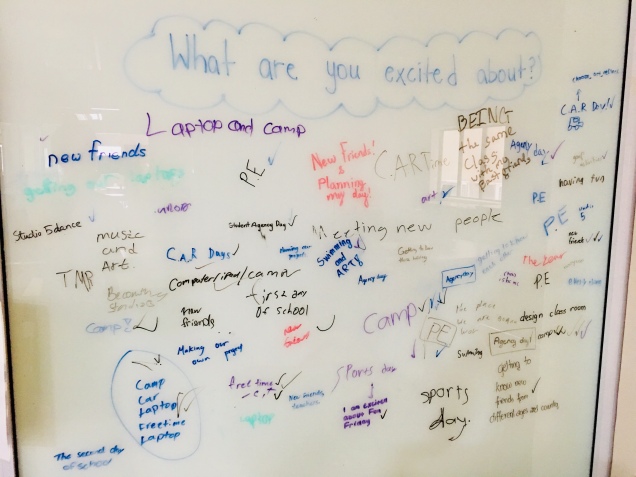

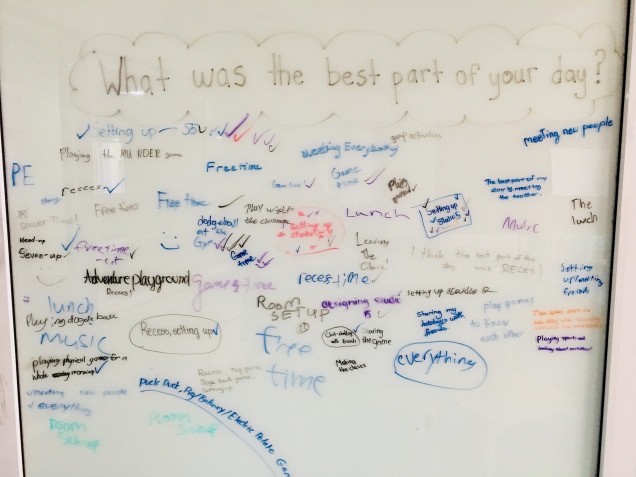

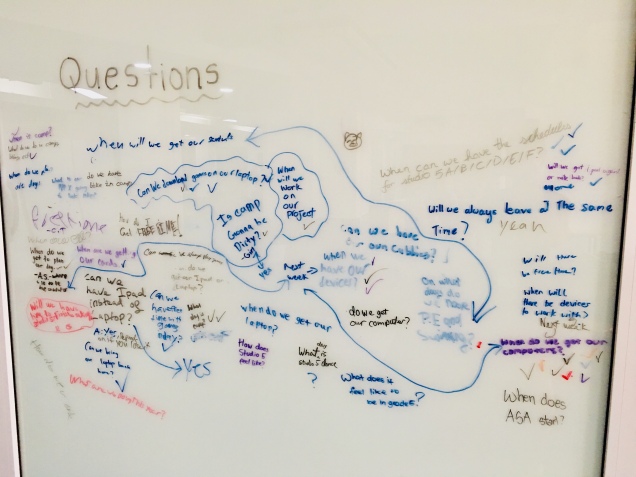


7. Act on student voice
Having a place for student voice, and actually acting on student voice are two different things. So we knew we wanted to make it clear to students that not only were we taking time to read and analyze what they shared with us, but we were also using that data to reflect on our own practices and decisions as well create the plan for the following day.
In order to make sure students knew their voices were being heard, we were transparent in each step of the process. Students knew that when they went home on the first day, we stayed and spent over an hour reading each and everything they wrote and using their feedback to create a plan for the second day. We compiled all the most common questions, ideas, worries etc. and visibly shared that data with the students the morning of the second day, then took the time to have small group discussions based around those topics.

Their feedback not only impacted what we did, such as allocating more time for set-up, but also how we did things. For example, the first day we stayed in our smaller advisory groups for the co-constructed get to know you activities. But based on the feedback we got from students, we discovered they wanted a chance to do some of those activities in small mixed groups, with different students across the grade level. So based on that suggestion, we got together as a team, identified the activities that were most popular to all 6 advisory groups’ brainstorms and decided to have a sign-up based “get to know each other time”…. an idea we probably would not have ever thought of without them!

Here are our reflections from the week:
It was SUCH an enjoyable first week. As a team, we couldn’t believe how energized and happy we all felt at the end of each day and how excited we were for the following day!
It planted the seeds for a strong sense of community. Both amongst the teachers, the students, the advisory groups and the grade-level as a whole, you couldn’t deny there was something special going on. Even after only a few days, you could feel that we were a crew, a team, a family.
There was lots of positive feedback from students and parents. It was amazing to see students bringing their parents, siblings and friends through the grade-level for tours to show off what they had been up to the first few days of school. We also received emails and had pop in visits from parents to share how energized, empowered and engaged their children had felt when they came home each day.
The week leading up to school was a breeze. Usually teachers spend endless amounts of time (and often money) setting up their classroom and meticulously planning the first week of school. But because we planned do to the set-up and planning with our students once they arrived, we found ourselves with lots of spare time to hang out together, play games and ease into the school year.
It set the tone for a democratic community. Because we purposefully made all the decisions with the students from the moment they arrived, a culture of shared decision making and a flattened power structure has already started to emerge. For example, sometimes when all 130 of us get together in a townhall meeting, the students self-organize and collect each other’s attention without any input or intervention from the teacher.
It’s essential to differentiate support for students. That amount of voice, choice and ownership can look and feel quite different depending on the student. We tried to be cognizant, empathetic and supportive to students coming from a more traditional school system, as well as students with specific learning, language, social or emotional needs.
Overall, it was THE BEST first week of school I have ever experienced. Of course, we have a lot of room to grow and improve, as this was the first time our team attempted anything like this. But we can feel good to know that how we approached the first week aligns with our belief that students have the right to have their agency respected and supported during their time at school.
However, we’re not experts and we don’t pretend to be – we’re just risk-takers, firm and passionate in our belief of what we think school should be. That’s why I used the word “could” in the title of this post, instead of “does”. These are simply the ways we tried to respect and support the agency of our students during the first week of school – I’m sure there are many other ways out there.
How are YOU planning to start the year with a focus on student agency?
Thanks for sharing Taryn. Fabulous ideas 😃 I will Share with others & copy you in. Congratulations on the great work you & your team Are doing.
Warmest regards,
Maxine Driscoll
Sent from my iPhone
>
LikeLike
I wish I “could” read this post the week before , as we are already into the second week and I can resonate so much to everything that I wanted it to look like, but probably did not because we used a lot of time to plan it ourselves instead of with the children.
A great read and a big reflection for next year 👍🏻😊
LikeLike
My first week is in one week and I am so glad I read this first. Despite all of the time I spend in trying to give my students more agency, I didn’t even think about the first week of school. Thank you for this advice!
LikeLike
Thanks a lot for sharing it!! I will try to come up with our first week with 4-5 years old children. A big challenge 🙂
LikeLike
Really helpful process. Thank you for unpacking your process with such clarity. This has been a big help for me as I consider how to launch my own G5 classroom this week. I’ll borrow, I’ll tweak and I’ll try to feed back. So impressed by the honesty and aspirational approach of your process.
LikeLike
Thank you so much, it has useful ideas. I will use some of them this first week with year 2 students.
LikeLike
Thank for sharing this. My school has a fixed timetable with subjects like Mandarin, Religion, PE, PA and also English Literacy. Those subjects have a specific time and MUST be done. How can I make “the students as the agency” possibly happen in my class as I have the fixed timetable? Kindly advise. Thank you.
LikeLike
Hi Laura, my best advice is always to grow your own innovation for your own unique context. Here’s a blog post I wrote that expands upon the idea of first figuring out your “why” then working with others in your context to grow “hows” and “what’s” that honour your “why” in ways that make sense for your context. https://ibeducatorvoices.wordpress.com/2018/04/10/innovation-needs-to-be-grown-not-transplanted/
LikeLike